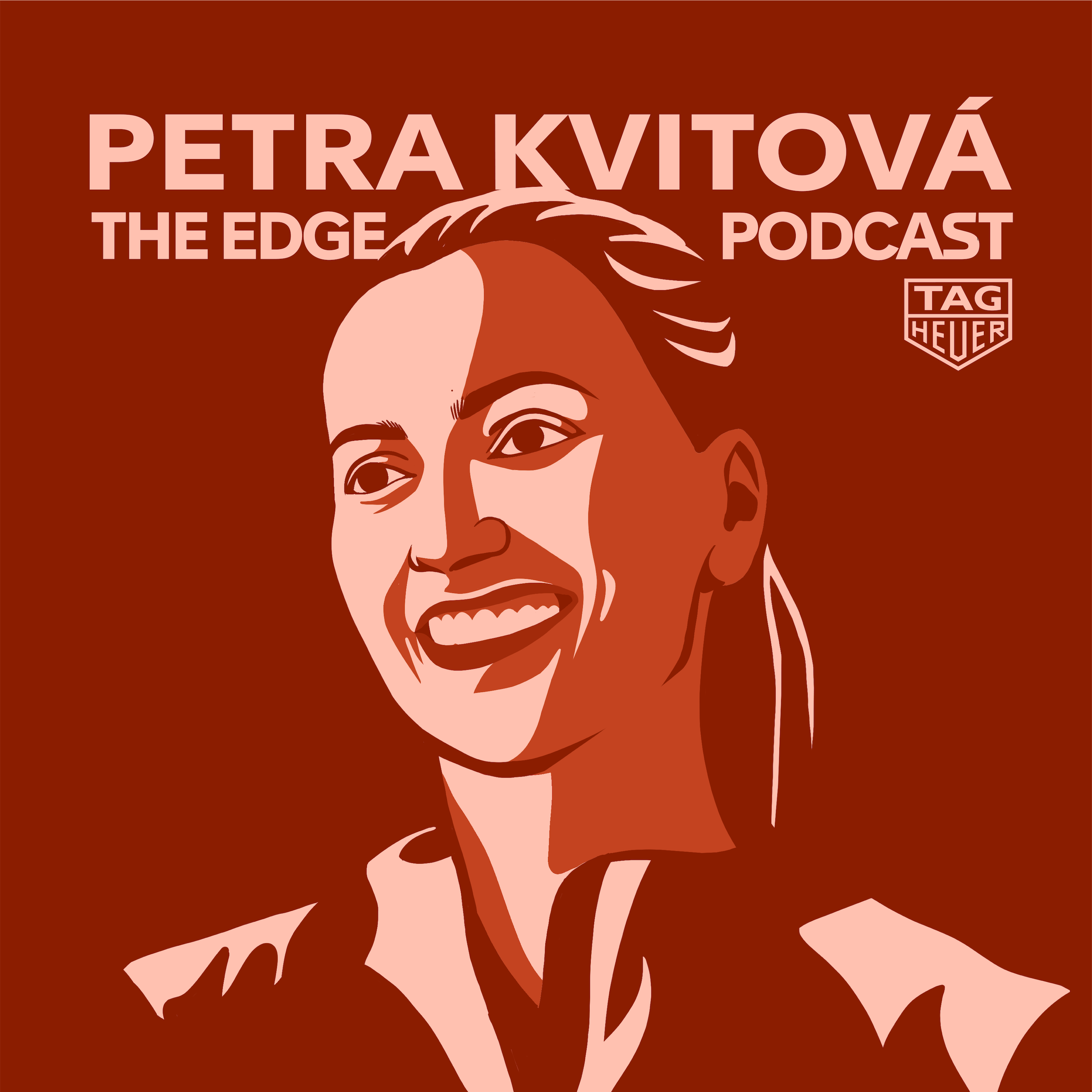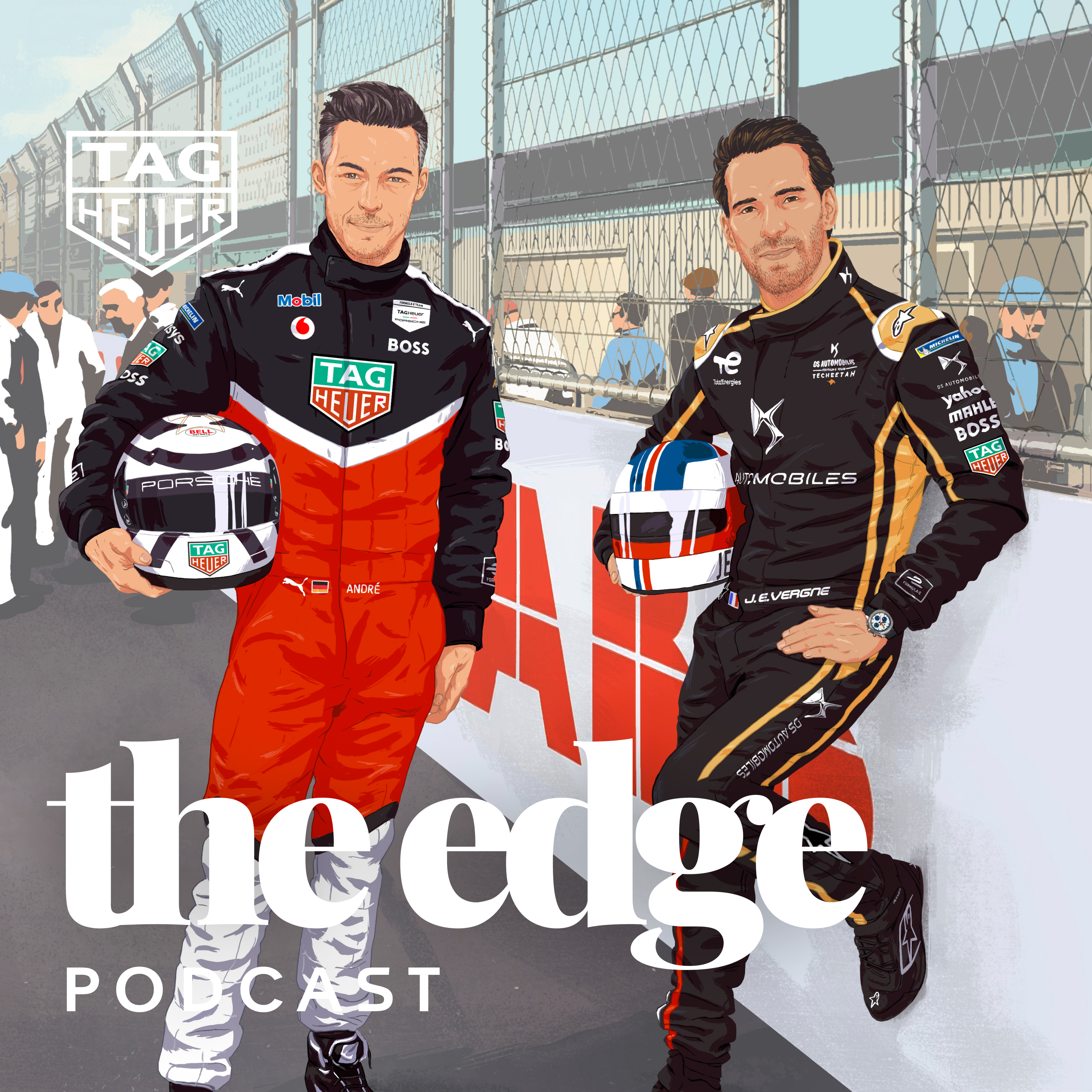Episode Transcript
[00:00:02] Speaker A: Hello, I'm Teo van Denbrooker. Welcome to a very special episode of the Edge, a podcast by Tag Hoyer. It's the season three finale, and to wrap up what has been another incredible series, we've put together some of our favorite snippets featuring our exceptional guests. We had the pleasure of speaking to teen swimming sensation summer McKintosh, who told us about her extraordinary gold medal winning feats. Stuntman and stunt coordinator Riley Harper walked us through the thrills of being a stuntman. We also caught up with racing driver Alexander Rossi, who recounted his victory at the hundredth running of the Indianapolis 500 as a rookie. And tennis ace Petra Krivitova uncovered the secrets of her long lasting career. We've had so many remarkable guests this season, like Roberto Lacorte, the man behind the ambitious flying NiCA sailing project, and the trailblazing president of the Indianapolis Motor Speedway, Douglas Bowles. To mark the hundredth 24 hours of Le Mon, we also chatted with Ers Karate, the director of Porsche Motorsport, LDMH factory racing, former FIA endurance champion Mark Lieb, and the talented Porsche works driver, Joshua Rogers. If that wasn't enough, we also spoke to the fastest man in the world right now, Fred Curley, as well as Formula E drivers Pascal Verlein and Antonio Felix de Costa. Each of these guests left us feeling inspired. So a big thank you to all of them. Now let's put this time machine in reverse and enjoy the best of season three. This is the Edge, a podcast by Tag Hoyer.
Let's begin with Summer McIntosh, who tells us about the moment she seized her fourth gold medal. Life lessons that she's learned along the way, and how to develop a winning mentality.
[00:01:45] Speaker B: To win that fourth gold medal, I mean, I think it was a really surreal moment. It feels like I just won my first one back in 2022. And just to kind of have that moment again and have my family in the stands and know that all my friends and family have been cheering me on since I started the sport of swimming. It was a really nice moment to share. And if I told my seven year old self this is where I'd be today, I'd just be so happy with what I've been able to achieve this far.
I think going into each race, no matter if it's my best race or my worst race, I definitely have confidence. And I think that all kind of stems from my training.
But before my race, I don't try to think too much about the time I want to go or record or placement that I want. I mean, obviously everyone diving into the pool wants to win, but it matters who wants it the most and who's worked for it the most. So that's what I try to kind of keep telling myself is as long as I keep training as hard as possible and prove as much as possible, that's all I can really control. And you can't control what others do. So just trying to focus on myself heading into those big races is what kind of keeps me in the moment and keeps me being able to perform at my highest.
Even though I started off at such a young age, I think at quite a high level, like making the Olympic team at 14. I think I'm just so grateful that I was able to experience those things at such a young age because it taught me so many young, so many life lessons that I never would have had if I weren't to be in the situation I am today. And even though I have already achieved things like four gold medals at a world championships, I'm always shooting for more and always trying to improve as much as possible as a person. In and out of the pool in the moment. Each time I've touched the wall and got either on the podium or got a gold medal at the world aquatics championships, I think it's always just kind of a disbelief moment for me. But at the same time, it feels so real and I just get super overjoyed and happy. I mean, I'm not an overexpressor person. I mean, some swores will celebrate and sit on the lane rope, but that's just not me. That's not a personal thing to me. Obviously, I respect that. But that's how I feel on the inside. I just don't usually show that on the outside, but yeah, I mean, it's always just such a cool moment. To be able to represent my country at such a high stage in the world and to do it in front of a bunch of fans is also really cool.
Ever since a young age, I've always really loved just being in the water because I feel like I've heard this from a lot of other swimmers. It's just kind of their kind of meditation time. You feel very as you can't really hear anything when your head submerged and you have lots of time to think, especially during practice.
And it just kind of is a very calming experience. Even when I'm not training, if I'm swimming or in a lake or an ocean, like in Florida, I mean, it's always a good time and I don't know, I've always loved water ever since a young age, no matter what level I'm doing it at, whether if it's for training or just for leisure.
[00:05:11] Speaker A: Next up, stuntman and stunt coordinator Riley Harper. Riley took us behind the scenes, explaining the emotions and the craft behind demanding stunts.
[00:05:20] Speaker C: Demanding stunts. For me, there's two categories of those. There's mentally demanding, which is, for instance, something that is something that I've done my whole life, like riding a motorcycle. And there's a very specific thing you have to do, which is go down this mountain, jump off this ledge, land in between these trees and then dodge an explosion and come out the other side.
If all those factors weren't there, I could do that with my eyes closed almost. But you add in all these factors of a big cliff on one side and all these things that can play into ruining what you have to do, basically.
And those, for me, are the most mentally demanding because there's such high consequence of getting hurt or dying on a lot of these.
And you really have to grasp your mind of what's going on and just do the feet that you have in front of you. And then there's the really physically demanding ones. That could be a very simple task, whether it's being on a cable and getting flung across a room and hit the ground and roll 10ft and you know it's going to hurt no matter what. And it's just the act of trying to make it not hurt as much as possible. And having to do that potentially 3510 times, waiting for everyone to get the shot as they want. That's the stuff that's very physically demanding, that is the repetition of doing multiple shots. That really just wears on you.
Golden arc for being a stuntman is just your general trajectory. I feel like everyone has different paths within the stunt industry as a whole. There are so many different avenues nowadays. When I was growing up and when I was young, my dad and everyone in that era of stunts, you really had to do every single aspect of stunts. You had to be really good at everything or else you couldn't work. You'd be on set in the. Had to be able to, at the drop of a hat, kind of do anything.
Nowadays, there's a lot of very specific niche genres within stunts. A lot of people stick to their genre, what they're great at, and I always try to stick with the original, of trying to be great at everything. And so for me, it was always trying to do as many things as possible within stunts and kind of having my own personal bucket list of things I want to accomplish, whether it's flipping a car, or crashing a motorcycle, or doing a huge jump on a motorcycle, or doing a fireburn, or a high fall or a car hit. All these different aspects of kind of big stunts to me.
So my personal arc was always just kind of working with great people, first and foremost, and being in cool locations and having a lot of fun, but trying to kind of check off my personal list of accomplishments.
Every job is challenging, for sure, and every job has its own, its own challenges in every aspect. But for me, one of the biggest challenges is just being gone and not being home and being, living somewhere new all the time, and always being surrounded by the same people in the same environment. And it's really fun in that aspect, but it's also kind of tiring. You want to be home, you want to be with your family or your friends. And that whole side of it is always challenging, but I would say individual jobs and just really demanding ones. There's one point break, which is a really bad remake of the original point break.
And we shot that in Austria. And in that sequence, we shot all the motorcycle and car sequences for the movie, or majority of them, I should say. And that show, for instance, every day there was such high consequence of getting severely hurt, which I did molt. I dislocated my shoulder and tumbled down a mountain that was, I don't even know how long, but on a motorcycle, riding through very steep canyons with trees on each side and any little wrongdoing, you could get really badly hurt. And also, for some of the car sequences, flipping cars on purpose, a thing called a pipe ramp, where you basically hit a pipe that is angled like a ramp, and it flips the car on purpose, and you tumble down the road. And we did that. And there was probably 1000 foot cliff on our right, on a little two lane road with no barriers or anything to keep you from going over the edge. And that job just comes to mind as being an extremely. Every day you had to be so on top of your game and just on top of it to make sure you don't make any small mistake, because there's such a high consequence.
[00:10:28] Speaker A: Alexander Rossi is the man who won the historic hundredth running of the Indianapolis 500 as a rookie. We were lucky enough to speak to him about his iconic win and how that moment shaped his career.
[00:10:44] Speaker D: You.
[00:10:45] Speaker E: When I say that, I remember two things vividly from that day. One was the morning of, because I was a rookie, so obviously I had never participated, but I'd never attended an Indy 500 before. So my world was blown away by everything that takes place kind of between the hours of 09:00 a.m. To noon when the race starts.
And we're at this facility kind of practicing and qualifying for an entire month leading up to the 500, which is at the end of May. And it's the first time that you actually see the place full of people. And it's the one moment, I think, in my life where you felt like you were kind of like a Rock star, I guess, is the easiest way to put it. There was just so much kind of fanfare and excitement around you as being one of 33 drivers that were participating that day. And I've been fortunate enough to race in some amazing events around the world, and none of them really quite matched the level of the 500. So for me, even if I didn't, if I wasn't the lucky one to win that day, I still would have walked away from my 1st 500, falling in love with the event and wanting to come back for more in 2016. I didn't know any better. I just went into it and kind of my only expectation and my only goal was to finish the race. It was my 1st 500 miles race. It was my second race that I was ever going to do on an oval. And so I went into it probably with a lot of naivety, and I was pretty relaxed compared to everyone else just because I didn't really know the significance of the event. Now that I'm seven going on, eight years removed from that day, it's hard not to kind of get, I guess, enamored with what this race means and your desire to win it right. So you have to treat it like any other race, because ultimately, that's all that it is. It's just another Indy car race. There's more people watching, but ultimately everything else is the same. And you have to perform at your best. You can't really get caught up in the moment, but at the same time, you have to remind yourself of the position that you're in and how fortunate you are to be one of 33 racing drivers in the world that gets to do this race. And so you have to enjoy it still. So it's kind of finding that balance between just going out there and who cares? It's another racetrack with another race car, and you just got to go win to kind of taking in the experience and enjoying it because you only get so many of these, for me, that day. Let's see, one of the traditions here is like a bomb goes off at 06:00 a.m. To signal that the gates are opening. So that wakes you up, and then you kind of have your coffee, your breakfast, whatever. And then we would always go and watch the Monaco Grand Prix, because that would be on kind of at the same time that we would be kind of just sitting around doing nothing. So you'd watch that, and you kind of watch that with your team and teammates, and you'd be in the engineering room, and there was this, like, as every kind of 30 minutes pass getting closer to racetime, everyone got quieter and the anxiety level kind of starts to go up. So the race is just a nice way to kind of think about something else. So you'd watch Monaco, and then you kind of have your final discussions with your engineers. So the big thing about the day of Indianapolis or of the Indy 500 is you're trying to choose a downforce level. So what that means is, because it's noble, the least amount of downforce that you can run and still be full throttle for the entire lap is obviously better because less downforce is less drag and a faster speed. But the problem is this track, because the speeds are so high, is very sensitive to wind, to wind speed, to wind direction, also to the track and the ambient temperature. So you're trying to predict exactly what the wind gusts are going to be in a couple of hours and what the track temp is going to be, and then you're trying to choose a final downforce level that you're going to race with.
So that's kind of your last big decision that you have to make. And then about an hour and 15 minutes before the race starts, you kind of go. All the drivers gather together in basically a green room, and you then go out. So in Indy, it's eleven rows of three, so they start with the last row of three and work their way forward, and they do these driver introductions. And that's on the front straight. In front of, I think, 130,000 people sit on the front straight. And then they kind of do, like, a group photo. And then the first race before the race is everyone. Then there's two restrooms that you have access to. So all 33 people rush to these two restrooms to do what they need to do. And then you kind of make your way back out to the grid. And then that's when kind of all of the pageantry of the 500 starts.
[00:16:23] Speaker A: Finally, here's Petrak Fittiva telling us about one of her career highlights at the Miami Open. She also gave us an insight into what it takes to sustain a long lasting career.
[00:16:35] Speaker D: My highlight of the season was definitely Miami Open. That's for sure the biggest title of the season.
I won a title in Berlin as well on my favorite grass, so it was a great one too, because some friends came and was pretty close to Prague, so they came to watch. So it was like, those are a little different, but Miami Open was the highest one.
It was amazing tournament. I have to say that I already started playing well in Indian Wells when I reached the quarterfinal, and I played very good tennis and Miami Open, I never like it that much because there is a lot of humidity and I have asthma. So for me, it's always pretty tough to play there in the conditions and I just played like run by round and I didn't really think that I can go that far even to the semi finals or whatever. But lucky me, probably when I'm playing longer in the tournaments, I play better. So that's always good to have. And that's what I probably showed in the Miami Open.
One tournament finished with the title and going to the next one, it's totally different story. It's different conditions, different courts, sometimes different balls, different players in the draw. And so I think, yes, when you're playing well, of course that you're going to have a bigger confidence. But on the other side, everybody wants to beat you, especially being in top ten, it's something which you are a target for everybody and everybody wants to beat you. When you win a grand slam, it's the same thing. So I think it's both sides and the tennis, it's tough in it because we have just one year to define all the points from the previous year. So I think it's really pressuring all the time. So when you win a title the next year, you have to defend it. So it's great to win a title. But on the other side next year it's like, oh, okay, this and this. Points. It's here. Okay, let's see.
I always thought that I'm going to lose, so it's always a big surprise if I win. I'm not the one who has too much confident and thinking that, okay, I'm going to win this tournament.
So I never have this mentality, it's my mentality and everybody has a different kind of. Of it. Yeah.
United's cup was a great, even I really enjoyed it. I love team competitions and especially with the men combined was something else, a different level and I really enjoyed it.
So it was a great start. Even. I played great tennis over there. And I felt pretty well. But unfortunately the Australian Open didn't go the way I wanted. I lost in the second round, but I think overall the beginning of the season wasn't that bad.
It's always tough when you lose, especially at the grand slam and beginning of the grand slam. And because I played pretty good tennis before, I probably thought that I will go a little bit forward. But sometimes the draw, it's tougher, the nerves and everything. It wasn't my day, but I was pretty upset after the lost and I went home and trying to forget and focus on the next tournaments which I had in Dubai. And that's always probably the right mindset that you need to focus what it's next that's good in tennis that you have always chanced next week.
I think it's every week challenge of the season, but for me probably was every day going to the practice actually, because I'm 33 and I'm doing it since I've been 16, traveling, playing tennis since I've been four and every day going for the practice. It's a routine. It's something which you are not even thinking. But on the other hand, I think it was a big challenge this year.
[00:21:20] Speaker A: That's a wrap on season three of the edge. Thank you for listening. If you'd like to hear from more extraordinary visionaries, athletes or artists, stay tuned for season four wherever you get your podcasts. And if you've enjoyed listening to us, don't forget to subscribe and leave us five stars. It does make a difference.
You can also head over to the Edge, our tag Hoyer magazine, to discover more stories, interviews and news about the latest tag Hoyer timepieces. We'll drop the link in our show notes. Thank you to all our amazing guests for joining us. We'll be back soon with another season of the Edge, a podcast by Tag Hoyer.
See you soon.






